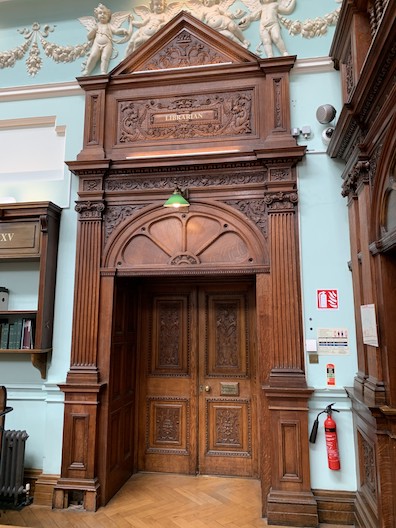9.228 A man of genius makes no mistakes
A Man of Genius Makes no Mistake
Two sentences in Scylla and Charybdis are frequently quoted and no less frequently misunderstood. In the library John Eglinton suggests that Shakespeare’s marriage to Anne Hathaway was a “mistake,” one that the playwright “got out of” as quickly as he could. ”— Bosh! Stephen said rudely. A man of genius makes no mistakes. His errors are volitional and are the portals of discovery.” Readers who attend to the context here will see that Stephen is not saying that Shakespeare (or, by implication, Joyce) writes infallibly. He is arguing only that a great artist can make art out of anything in his life, for example a bad marriage.
The library talk is a meditation on how Shakespeare transformed the matter of one life into art that has significance for millions. The writer himself was no sage, Stephen believes. He imagines him “weary of the creation he has piled up to hide him from himself, an old dog licking an old sore… untaught by the wisdom he has written or by the laws he has revealed.” But Will was good with words, and he had what somebody in the library calls “that queer thing genius.” Like Joyce, who found a way to make ordinary existence radiant, he started with the facts of his own life.
When the exchange with Eglinton occurs, Stephen has been speculating about Anne’s infidelity, and Russell has objected: “Interesting only to the parish clerk. I mean, we have the plays. I mean when we read the poetry of King Lear what is it to us how the poet lived? As for living our servants can do that for us, Villiers de l’Isle has said. Peeping and prying into greenroom gossip of the day, the poet’s drinking, the poet’s debts. We have King Lear: and it is immortal.” Eglinton seconds this view by calling Anne a mistake, but Stephen supposes that Shakespeare did not wash his hands of her. He left her behind in Stratford but also brought her to London in memory. This point is made several sentences later:
— But Ann Hathaway? Mr Best’s quiet voice said forgetfully. Yes, we seem to be forgetting her as Shakespeare himself forgot her…
— He had a good groatsworth of wit, Stephen said, and no truant memory. He carried a memory in his wallet as he trudged to Romeville whistling The girl I left behind me.
Citing examples from Venus and Adonis, The Taming of the Shrew, and Antony and Cleopatra, Stephen argues that Shakespeare folded this memory into work after work, turning Anne into Venus, Kate, Cleopatra, Gertrude, and many other women.
This clearly delineated context must be held in mind as one hears Stephen saying that “A man of genius makes no mistakes.” His unmistakable point is that Shakespeare found a portal of discovery even in something that had caused him acute suffering and regret. The troubles of his past were not “mistakes” (things wrongly “taken” up) which could be left behind, but “errors” (“wanderings” from the straight and narrow) which made him who he was and had to be confronted. His errors were “volitional”: Shakespeare chose to have sex with Anne and marry her, and later he affirmed her importance by writing about her.
If this is correct, then Stephen is not saying something that a moment’s reflection will show to be totally absurd. “A man of genius makes no mistakes” does not mean that a great writer cannot pen a bad line, choose a weak title, get his facts wrong, mix brilliance with mediocrity, slander the innocent, misjudge an audience, or write badly in some other way. No informed person could think this even of the venerable Bard. Eglinton says of Shakespeare, “He puts Bohemia on the seacoast and makes Ulysses quote Aristotle,” and Stephen calls the “To be or not to be” soliloquy an “improbable, insignificant and undramatic monologue.” Instead of claiming that Shakespeare’s writing is perfect, he claims only that his marriage must have been relevant to its composition.
Even the few annotators who have commented on Stephen’s sentences have missed this essential distinction. Gifford hears in them echoes of the Socratic idea of getting at truth through falsehoods. If this analogue has any relevance at all, it must be to the genius of the artist and not to Shakespeare’s marriage. Slote does not gloss the two sentences in his collections of notes, but in a 2 February 2022 blog (blog.oup.com/2022/02/a-man-of-genius-makes-no-mistakes-joycean-misapprehensions), he too supposes that what Stephen is talking about is the artist’s text: “Joyce implies that there are no mistakes in this text, just artistic brilliance that may or may not be properly apprehended.”
Joyce could scarcely have believed what Slote says, that “there are no mistakes” in Ulysses, given his dogged efforts to avoid and to correct them. There are numerous mistakes in the novel, some of them (like the substitution of “world” for “word” in Martha’s letter) quite deliberate, but many others certainly not “volitional.” Nor could he have believed that any mistakes that slipped past his scrutiny would inevitably become “portals of discovery.” Getting a Dublin house number wrong was unlikely to open doors of creative insight. Falling in lust with Marthe Fleischmann was a different matter.
John Hunt 2022
2011 photograph by Tony Hisgett of the farmhouse in Shottery, Warwickshire where Anne Hathaway was raised. Source: Wikimedia Commons.
A Portal of Discovery
Portals of discovery
In the library Stephen utters two of the most frequently quoted sentences in all of Ulysses, which happen also to be two of the most misunderstood: “A man of genius makes no mistakes. His errors are volitional and are the portals of discovery.” And the narrator, whoever that might be, seems to think something memorable has been said, because the following sentence reads, “Portals of discovery opened to let in the quaker librarian, softcreakfooted, bald, eared and assiduous.” This strange echo of a character’s words signals important changes that are coming in the book’s narrative method.
In one part of Hades Bloom seems unaccountably to be responding to something the narrator has said. Here in Scylla and Charybdis the narrator seems to be responding to something Stephen has said, with what seems a whiff of ridicule. (Portals of discovery?? That’s a bit grand, isn’t it? The only portals I see are made of wood.) These passages, and another one which will come early in Sirens, appear to exceed the unstated limits of free indirect discourse. According to those implicit rules, the style of the narrative may approximate the thoughts or words of a given character, sinking briefly into that person’s orbit and helping readers to see the world through his or her eyes. The narrator may not, however, enter the cast of characters by engaging in direct conversation. To do so would be to violate the reader’s expectation of receiving a detached, objective report of what is happening. What would become of a novel if its trusted narrative voice should suddenly fragment into a variety of subjective viewpoints?
Readers of Ulysses are about to find out. In Wandering Rocks the single source of reportage dissolves into a fairly bewildering variety of objective viewpoints, jumping all around Dublin, glancing now at this group of characters and now at that one, and even mixing bits of some scenes into the reporting of others. In every subsequent chapter, subjective viewpoints proliferate. Parodic voices alternate with objective narration in Cyclops and Nausicaa, and in Oxen of the Sun and Eumaeus such voices take over entirely. Circe adopts the form of a drama, abandoning third-person narration in favor of letting characters (and countless non-characters) speak for themselves. The abandonment of third-person narration culminates in the novel’s final two chapters. Ithaca takes the form of impersonal questions and answers, though the catechism is shot through with subjectivity and whimsical caprice. Penelope offers a pure monologue, neither a narrative nor a drama but simply a woman thinking––or talking, or writing.
“Portals of discovery” also announces the sharpening of another narrative device––repetitions of previously used phrases. This has been happening for a long time: Stephen thinks, says, or hears something in Telemachus or Nestor and that thing recurs in his thoughts, often with verbatim recall, in Nestor or Proteus: “odour of rosewood and wetted ashes,” “history is to blame,” “He proves by algebra,” “omphalos,” “saved men from drowning,” “oinopa ponton,” “Five fathoms,” “one great goal,” “burying his grandmother.” Similar phrases recur in Bloom’s thoughts, and Tom Kernan’s fondness for the phrase “retrospective arrangement” is noted and recalled by others. But in later chapters such phrases escape the contents of characters’ thoughts and begin to figure prominently in the author’s narrative art. Sirens plays with them to form quasi-musical variations on thematic motifs, and Circe uses them to construct an industrial-scale recirculating mechanism in which hundreds of previously heard verbal fragments whirl about as if the whole day is being seen through the window of a washing machine. For veteran readers of Ulysses one of this chapter’s pleasurable challenges is recalling the source every time such a familiar string of words appears on the page.
When the narrator of Scylla and Charybdis pointedly repeats what Stephen has said, readers are put on notice that the book itself is listening to, remembering, and thinking about what happens in it. As in the akasic records that preserve everything on the astral plane, anything heard, said, or done on June 16 may come back to fill consciousness again and perhaps open portals of discovery.
John Hunt 2023
Source: stock.adobe.com.
The door to the Librarian’s office in the National Library of Ireland, photographed in July 2023. Source: Randall Cone.


